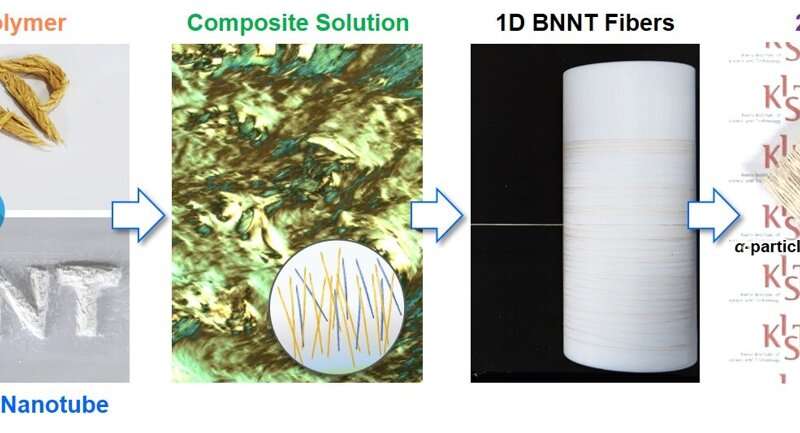This article has been reviewed according to Science X's editorial process and policies. Editors have highlighted the following attributes while ensuring the content's credibility:
fact-checked
trusted source
proofread
Space travel: Protection from cosmic radiation with boron nitride nanotube fibers

With the success of the Nuri launch last year and the recent launch of the newly established Korea Aerospace Administration, interest in space has increased, and both the public and private sectors are actively investing in space-related industries such as space travel. However, exposure to cosmic radiation is unavoidable when traveling to space.
A research team led by Dr. Dae-Yoon Kim from the Center for Functional Composite Materials at the Korea Institute of Science and Technology (KIST) has developed a new composite fiber that can effectively block neutrons in space radiation. The work is published in the journal Advanced Fiber Materials.
Neutrons in space radiation negatively affect life activities and cause electronic devices to malfunction, posing a major threat to long-term space missions.
By controlling the interaction between one-dimensional nanomaterials, boron nitride nanotubes (BNNTs), and aramid polymers, the team developed a technique to perfectly blend the two difficult-to-mix materials. Based on this stabilized mixed solution, they produced lightweight, flexible, continuous fibers that do not burn at temperatures up to 500°C.
BNNTs have a similar structure to carbon nanotubes (CNTs), but because they contain a large number of boron in the lattice structure, their neutron absorption capacity is about 200,000 times higher than that of CNTs. Therefore, if the developed BNNT composite fibers are made into fabrics of the desired shape and size, they can be applied as a good material that can effectively block radiation neutron transmission.
-

Development of BNNT composite functional fibers for space radiation shielding / If continuous composite fibers containing high content of BNNTs are used as functional fabrics, they can effectively shield neutrons in space radiation to reduce harmful effects on human health and prevent soft errors in electronic devices. These functional fabrics are expected to play an important role in the fields of aviation, space, and national defense. Credit: Korea Institute of Science and Technology -

Development of BNNT composite continuous fibers / By overcoming the low dispersibility of BNNTs through interaction with aramid polymers, stable composite solutions can be prepared. This paves the way for the development of composite fibers that take advantage of the excellent properties of BNNTs and can be effectively utilized in various applications. Credit: Korea Institute of Science and Technology
This means that BNNT composite fibers can be applied to the clothing we wear every day, effectively protecting flight crews, health care workers, power plant workers, and others who may be easily exposed to radiation.
In addition, the ceramic nature of BNNTs makes them highly heat-resistant, so they can be used in extreme environments. Therefore, it can be used not only for space applications but also for defense and firefighting.
"By applying the functional textiles we have developed to the clothing we wear every day, we can easily create a minimum safety device for neutron exposure," said Dr. Dae-Yoon Kim of KIST.
"As Korea is developing very rapidly in the space and defense fields, we believe it will have great synergy."
More information: Ki-Hyun Ryu et al, Spacesuit Textiles from Extreme Fabric Materials: Aromatic Amide Polymer and Boron Nitride Nanotube Composite Fiber for Neutron Shielding and Thermal Management, Advanced Fiber Materials (2024). DOI: 10.1007/s42765-024-00432-6





















